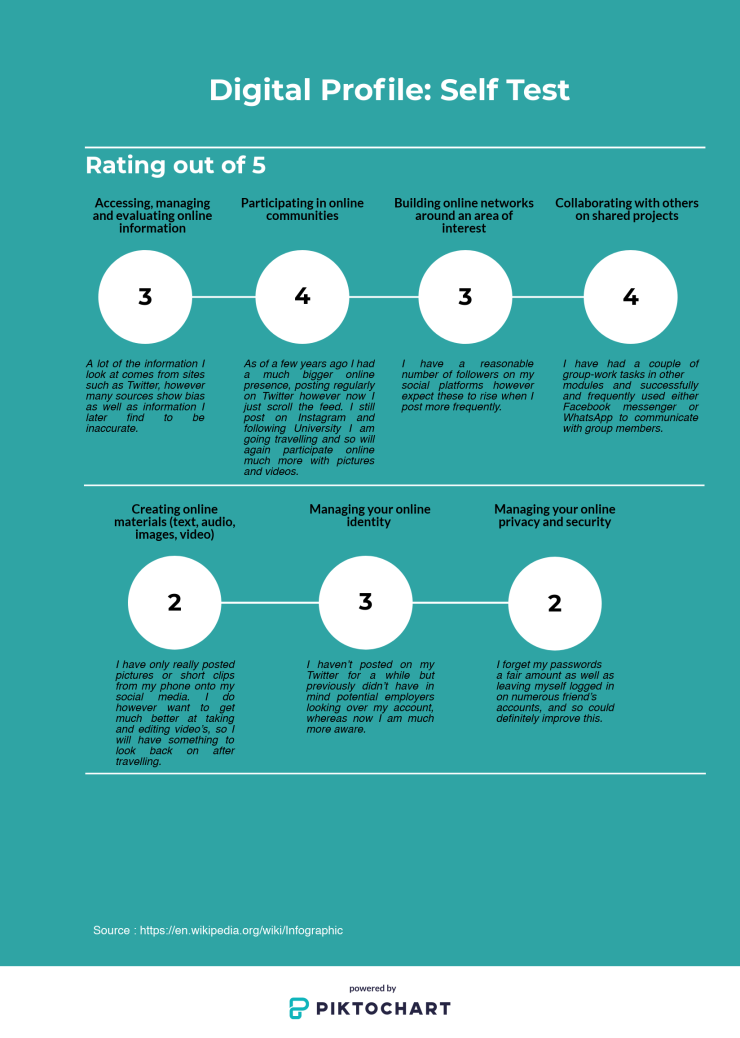
Digital natives are the generation of people born during or after the rise of digital technologies whilst digital immigrants are those born before the advent of digital technology (HuffPost, 2018).
There are stark differences between digital visitors and residents. Visitors tend to only use platforms if they see it to be beneficial. Whilst remaining anonymous, they are unlikely to have any form of persistent profile online which shows who they are digitally. There also stems the idea that if you were to have a ‘real’ social life then you wouldn’t choose to socialise online in a visible manner. Although I disagree with this statement I still choose to remain virtually invisible online. This opposes the digital residents, who spend a proportion of their lives online, with the distinction between online and off–line becoming increasingly blurred. Residents are happy to go online simply to spend time with others and they are likely to consider that they ‘belong’ to a community which is located in the virtual (White and Le Cornu, 2011).
White and Le Cornu (2018) described digital visitors and residents as a way to describe a wide range of modes of online engagement. It has proved to be a useful way to come to an understanding of individuals’ motivations when they use the web in differing contexts. My Digital Profile Self Test showed that currently I would come under the banner of the visitor, with a relatively small digital presence. I tend to scroll through my various social media sites rather than post anything on them. I also watch videos on sites such as YouTube however do not actually make any content myself to publish. I would expect this to change in the coming years, as I hope to regularly blog whilst travelling as well as taking, editing and producing videos.
Word Count: 299
References:
- HuffPost. (2018). Digital Natives vs. Digital Immigrants. [online] Available at: https://www.huffingtonpost.com/jeff-degraff/digital-natives-vs-digita_b_5499606.html [Accessed 10 Feb. 2018].
- White, D. and Le Cornu, A. (2011). Visitors and Residents: A new typology for online engagement. First Monday, 16(9).
- White, D. and Le Cornu, A. (2018). Visitors & Residents. [online] Digital – Learning – Culture. Available at: http://daveowhite.com/vandr/ [Accessed 10 Feb. 2018].
Hi Will, really interesting blog here. I find your point on how individuals remain anonymous online despite having a presence online to be true as I feel many people of a younger generation are similar to this. I feel this is true because many people tend to ‘scroll’ through their social media without actually posting and commenting regularly. I also find your point interesting about how in the future you feel that you may develop a stronger online presence. I think this applies to me as well as blogging is a way to have a positive online presence that allows friends and families to keep up to date in your life without having regular interaction. I was just wondering why you have not discussed Prensky’s conceptual differentiation in this area when looking at digital natives versus digital immigrants? I am interested to see where you fall on this scale as well?
LikeLike
Hi Dom,
Thanks for your reply. I agree with your view about how blogging allows you to have an informal relationship with people online whilst keeping those close to you updated in your life. Regarding Prensky’s (2001) work, although I am supposedly a digital native, I find myself knowing far less about technology than my peers. My digital competence level would more likely fall under digital immigrant. I believe this too be true through having difficulties with programmes such as Excel, where future employers will be expecting people of my generation to be fully competent with such programmes.
Thanks,
Will
LikeLike